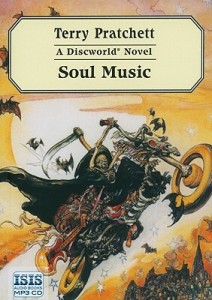Title: Soul Music
Series: Discworld #16 (Death #3)
Author: Sir Terry Pratchett
Genre: Low Fantasy
Trigger Warnings: Death, parent death (mentions), fantasy racism, war, animal death (mentions), alcohol use, violence
Spoiler Warning: This book is sixteenth in a series, but this book and this review contain only mild spoilers of the first Death subseries book, Mort.
Back Cover:
It’s hard to grow up normally when Grandfather rides a white horse and wields a scythe – especially when you have to face the new music that has entered the Discworld. It’s got a beat and you can dance to it, but… It’s alive. And it won’t fade away.
Review:
The books in the Death subseries follow a similar pattern. Death has a crisis about something (usually something related to how he’s fundamentally not a human). Death does something royally stupid about it (in Mort, that was take an apprentice like a human would; in Reaper Man and now Soul Music, that’s just not doing his job). Things go very badly. And fundamentally, nothing changes.
I think that’s the root of my frustration with the Death books. At the end of each one, Death seems to realize that he’s fundamentally different from humans – he can’t be one or even act like one without horrible consequences. But then in the next Death book, he does it all over again. He learns nothing, and his actions overall change nothing. It minimally affects people he interacts with or who have to deal with him not doing his job, but consequences are always fixed by the end of the book. In fact, in this book, absolutely everything is undone and everyone forgets what happened, so there’s barely a point to having the story happen in the first place.
I don’t know if it’s some kind of commentary on the unchanging nature of death or what, but I wish he’d learn his lesson already. He is an interesting character, and I want to see him in plots where he actually gets to actively do something instead of just run away from his job and fail at being a human.
The books in the Death subseries are never all that much about death, either the character or the concept. Soul Music was instead about music. But it doesn’t actually get there initially. Death tries to master the human art of forgetting by joining the Klatchian Foreign Legion and drinking a lot of alcohol. Since we can’t have the exact same plot as Reaper Man, Death’s granddaughter Susan fills in for him. Her sections started off some interesting themes of education getting in the way of observable reality and how humans cope. And then it just lost the track of those because the music is the big thing in this book.
Although Susan is a fairly major player and Death gets some page time, the bulk of the plot focuses around Imp. He’s a country lad who came to Ankh-Morpork to make music, where he forms a band with the troll Cliff and the dwarf Glod and invent “Music With Rocks In.” It’s an obvious parody of rock music, and the band quickly becomes obvious parodies of rock stars – Imp’s full name even translates to “bud of the holly.”
I had a hard time with the characters. For supposedly being a book in the Death subseries, Death gets hardly any page time at all. Susan was supposedly seventeen, but she acted more like she was twelve. And Imp didn’t get much of a chance to be a character because he spent most of the book being basically possessed by music. The characters really seemed to be second to the ideas: Music, its effects on people, its role as a fundamental part of the universe. And a very heavy satire of young people and the rock and roll craze of 1960s-1990s. (A full half of the Discworld Wiki page for this book is a list of rock and roll culture references this book makes.)
That’s not to say it was all bad. There are plenty of Sir Terry’s signature witticisms and several genuinely funny moments. Characters from previous books, including the Unseen University wizards and C.M.O.T. Dibbler, are involved – and Archchancelor Ridcully is frankly hilarious. But this is the most specifically and heavily satirical Discworld book I’ve read so far, and since most of the rock and roll culture being satirized happened before I was even born, most of the satire fell flat for me. It’s not necessarily a bad book. It’s just not one that particularly worked for me.
The Discworld series:
- The Colour of Magic
- The Light Fantastic
- Equal Rites
- Mort
- Sourcery
- Wyrd Sisters
- Pyramids
- Guards! Guards!
- Eric
- Moving Pictures
- Reaper Man
- Witches Abroad
- Small Gods
- Lords and Ladies
- Men at Arms
- Soul Music
- Interesting Times
- Maskerade
- Feet of Clay
- Hogfather
- Jingo
- The Last Continent
- Carpe Jugulum
- The Fifth Elephant
- The Truth
- Thief of Time
- The Last Hero
- The Amazing Maurice and His Educated Rodents
- Night Watch
- The Wee Free Men
- Monstrous Regiment
- A Hat Full of Sky
- Going Postal
- Thud!
- Wintersmith
- Making Money
- Unseen Academicals
- I Shall Wear Midnight
- Snuff
- Raising Steam
- The Shepherd’s Crown

